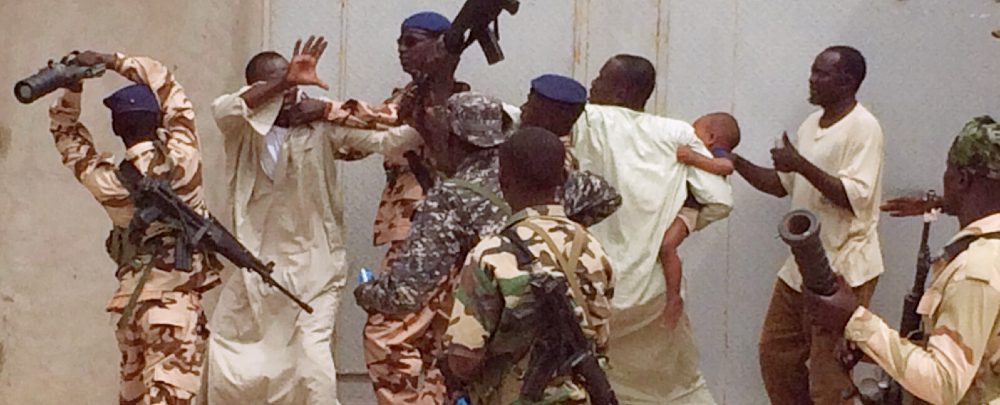
Chadian security forces confront protesters on the streets of N’Djamena. (Photo: (VOA/André Kodmadjingar)
Chadian President Idriss Déby died on April 20 from wounds he sustained on the frontlines of fighting against the rebel group le Front pour l’alternance et la concorde au Tchad (FACT). While widely characterized as opening the door to instability, Déby’s death in battle vividly punctuates the outcome of instability wrought under his regime. Instability in Chad has simmered for decades, disrupted by periodic explosions of violence. Corruption, political exclusion, growing disparity, and repression of dissent have long been trademarks of Déby’s rule in Chad, which not coincidentally ranks 187th out of 189 countries on UNDP’s Human Development Index.
Unless these grievances are addressed, Chad’s instability can be expected to persist. This has regional repercussions given Chad’s strategic location connecting central and western Africa with Sudan and the Maghreb. Expanding Chadian insecurity has implications for the conflicts in the Lake Chad Basin, Libya, Sudan’s Darfur, the Central African Republic, and the western Sahel.
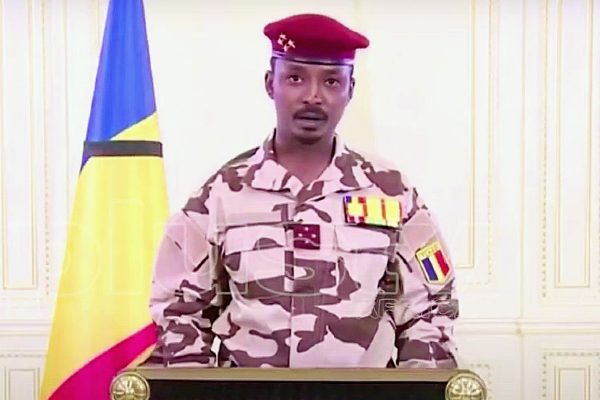
Mahamat Idriss Déby. (Image: video capture)
Déby’s death has put the internal vulnerabilities of his authoritarian government glaringly on display. Lacking legitimacy and unwilling to adhere to the constitution’s succession plan, regime loyalists organized a military coup d’état dissolving the executive branch, the National Assembly, and the constitution. In effect, the military junta, led by Déby’s son, General Mahamat Idriss Déby, is vying to perpetuate Déby’s 30-year authoritarian rule.
The fundamental factors driving Chad’s instability remain unchanged. Given that military governments hold an abysmal governance track record, there should be no expectation that the military’s seizure of power will lead to improvements in Chad’s political, social, economic, or security fissures.
Faced with an armed rebellion comprised of at least four rebel groups, a lack of legitimacy, widespread discontent, and an increasingly mobilized civilian opposition, the junta will be forced to use ever greater repression to retain power. International support for the junta, absent a legitimate civilian political transition (not a faux process managed by the military junta), risks reinforcing the Déby legacy of relying on force to resolve political differences—and the instability this model generates.
Instability Inherent to Chadian Authoritarianism
Political repression increased in the last years of Idriss Déby’s life. Opposition leaders routinely faced threats to their lives with tragic consequences. Ahead of the April 11 presidential election, soldiers descended on opposition candidate Yaya Dillo Djérou’s residence to arrest him. One of Déby’s Zaghawa kinsmen and a former government official, Dillo posed an internal political threat to Déby, even though the Supreme Court had already rejected Dillo’s candidacy. When the soldiers arrived, members of Dillo’s household clashed with the security forces who responded by opening fire, killing Dillo’s mother and at least three others.
Déby also relied on institutional maneuvers to manipulate the political system to his advantage. In 2018, he organized a national conference, which excluded many prominent opposition figures, to rewrite the constitution. In doing so, he made a show of restoring presidential term limits—after having abolished them in a 2005 referendum. Unsurprisingly, the limits were non-retroactive, extended the length of his term, and raised the required age of presidential candidates. These changes limited challenges from rising political actors and insured he would be legally allowed to contest elections until 2033.
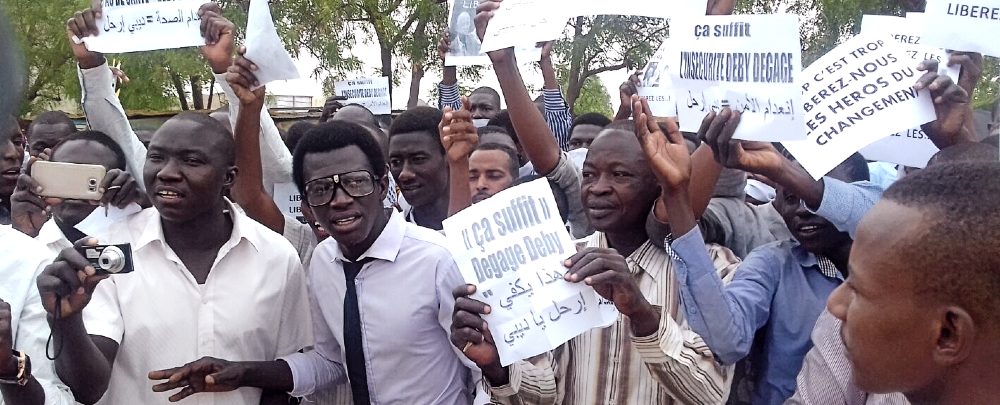
Protesters in N’Djamena, April 2016. (Photo: VOA)
Under Déby’s rule, Chad has consistently ranked as one of the five poorest countries in the world. The measure and persistence of the country’s underdevelopment is sobering, particularly considering that the oil sector provides about 60 percent of export revenues and up to one third of overall GDP since coming online in 2003. Roughly 6 percent of the population has access to electricity. Only 8 percent has access to basic sanitation. Just one in five adults are literate, and one in three births take place in the attendance of a health professional. Life expectancy is one of the lowest in the world at 53 years.
These dire conditions contribute to more than 6 million Chadians—40 percent of the entire population—needing humanitarian assistance. This includes 330,000 IDPs, mostly around the Lake Chad region, where displacement figures doubled in 2020. Across the country, 1.8 million people are expected to suffer from food insecurity in 2021, an increase by more than 50 percent from last year.
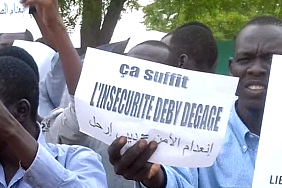
A sign demanding Idriss Déby step down. (Photo: VOA/Bagassi Koura)
Characterizations of Chad as a lynchpin for stability in the wider region overlook the continued conflict waged by the armed opposition. FACT is only one of at least four well-armed Chadian rebel groups that have used southern Libya as a rear base during the 2010s. The leaders of these groups trace their origins to previous rebellions against the Déby regime in the 2000s. The armed forces, additionally, face serious security threats on Chadian soil from militant Islamist groups operating in the Lake Chad Basin. The military suffered its greatest loss of life in a single attack when Boko Haram militants stormed a base in Bohoma in 2020.
In short, Idriss Déby failed to produce stability in Chad. Political violence, assassinations, disappearances, economic crises, extreme poverty, coup attempts, militant Islamist insurgency, and armed rebellion litter the decades of Déby’s rule. Few examples stand out more starkly against the myth of the strongman as a stabilizing force than Chad.
Chad’s 2021 Military Coup d’État
Idriss Déby came to power as a rebel, and in Chad’s post-independence history, all transfers of power have occurred by force.
“Few examples stand out more starkly against the myth of the strongman as a stabilizing force than Chad.”
General Azem Bermendao Agouna announced Déby’s death and the seizure of power by the military junta simultaneously. Ignoring the constitutionally enshrined process, the junta anointed Mahamat Idriss Déby as interim head of state. The 2018 constitution, drafted by Déby’s political allies, states that in the event of a vacation of power, the president of the National Assembly should be appointed as interim president and lead the country to elections within 90 days. The constitution also states that any candidate for president must be 45 years old and a civilian, thus excluding Mahamat Idriss Déby who is 37 years old and an army general.
By taking these actions, the junta has shown an unwillingness to cede authority to a civilian, preferring to manage the rebellion on its own terms. This is particularly clear in the ongoing clashes between the military and FACT. After initially rejecting the military junta’s claim to power, FACT rebels made overtures for a cease fire and dialogue. The junta, however, responded by publicly excluding any possibility of negotiation. Such a posture is likely to prolong hostilities and strengthen the conclusion by rebel and opposition groups that the use of force is the sole means to gain political power. Worse, it may bring additional militants into the fray, sparking state-led violence against communities within which these armed groups have strong constituencies.
Possible Indications of Faltering Control
Deteriorating security may also contribute to a fracturing of the armed forces. The Chadian military is often praised as one of the most effective fighting forces in the region. Many units within the armed forces have significant combat experience from fighting rebellions at home as well as combat tours abroad in Mali, Nigeria, Burkina Faso, Niger, and the Central African Republic. Units have also mobilized against threats emanating from Sudan and Libya and have contributed to UN peacekeeping missions.
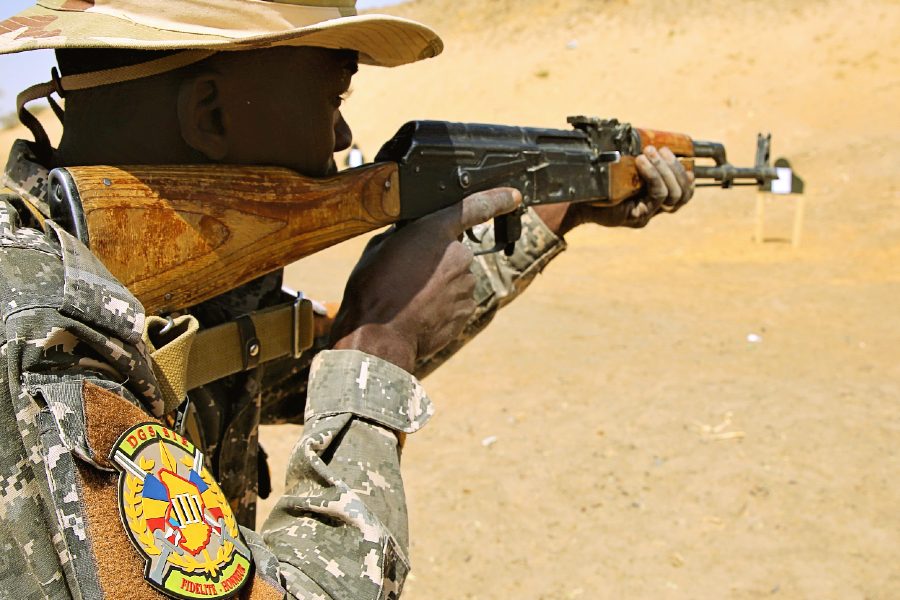
A member of Chad’s DGSSIE training. (Photo: Sgt. Derek Hamilton)
The composition of the armed forces, however, remains highly fragmented with certain units and leadership structures benefiting disproportionately due to their ties to the Déby regime. This is perhaps most evident in the Direction générale de service de sécurité des institutions de l’État (DGSSIE). These elite special forces within the army deploy on counterterrorism missions and were used by Déby as a domestic military intelligence service and praetorian guard. They have similarly benefitted from disproportionate access to training and equipment procurements. Mahamat Idriss Déby has led the DGSSIE since 2014, reporting directly to his father.
Other units within the military have not benefited from close ties to the regime. These include units comprised of former rebels that had been integrated into the national armed forces under Déby’s rule. Control over these units depended on patronage and ethno-regional ties to their respective territories. It is not at all clear that Mahamat Idriss Déby, or those who compose the leadership of the junta, will be able to fully command the fealty of these units, particularly in the event of widespread conflict or insecurity.
In addition to the threat of intensifying insecurity, the junta has been confronted by an increasingly mobilized political opposition and civil society. Protests against the junta’s illegal seizure of power erupted in the streets of N’Djamena and other urban centers in the country. The junta reacted by firing live ammunition on demonstrators resulting in several deaths and hundreds arrested. These actions have strengthened the political opposition’s condemnation of the coup.
Chadian civil society has also played a role in pressuring the government, often under the risk of severe repression. Leading voices from the Chadian Human Rights League and the Association of Chadian Unions have already denounced the military junta, calling for a civilian-led transition. Other civil society organizations opposed to Déby’s continued evasion of presidential terms limits and the manipulation of the constitution to his benefit have also expressed their opposition.
“A framework for political dialogue does exist and could be expanded … if the ruling party were interested in engaging the opposition through dialogue rather than force.”
Despite Chad’s highly constrained political space, a framework for political dialogue does exist and could be expanded to include more actors, if the ruling Mouvement patriotique du salut (MPS) party were interested in engaging the opposition through dialogue rather than force. Established in 2013, the Cadre National du dialogue politique (CNDP) brings together representatives from all registered political parties in Chad to resolve issues related to the electoral process and its administration. The CNDP’s representatives ostensibly provide oversight of the National Independent Electoral Commission and debate electoral rules. Its president rotates between members from the political opposition and parties in the majority.
While thus far hollow in practice, the CNDP could serve as an institution for a civilian-led dialogue and transition. The current CNDP president, Mahamat Zen Bada Abbas, also serves as Secrétaire Général of the MPS. In public remarks, Zen Bada has hitherto supported the junta’s claim to power, citing the security crisis confronting the country. Should the military leadership and MPS opt for a more strategic approach to resolving this crisis, they could engage the civilian political opposition and civil society within the CNDP to identify an inclusive representative process for a civilian transition.
Prospects for Stability
Chad has been on a path of perpetual instability. If the same power structure remains in place, similar outcomes, or worse, can be expected. If Chad is to move toward a path of sustainable stability, there will be a need to reimagine the domestic political arena to include all segments of society under a rules-based government. In the short term, this would entail the military junta stepping down and ceding authority to an inclusive civilian transitional framework. Such a framework could then address what is needed to establish a legitimate representative government, ultimately through multiparty elections.
A key element of any transitional process would be to convene a national dialogue that openly reviews the lessons of the past 30 years of authoritarian governance and builds a consensus around an alternate model moving forward. Chad’s opposition leaders have called for such a dialogue regularly, most recently ahead of this year’s presidential contest. In the wake of Idriss Déby’s death, there is a clear and urgent need for such action. Toward that end, the African Union’s Peace and Security Commission has dispatched a delegation to promote dialogue between the junta and its political opponents. Convening a national conference to reform the political system would provide a pause in hostilities and help avoid an escalation of political and economic instability.
“International actors need to recognize that internal stability in Chad is reliant on creating a more inclusive and rules-based political process.”
A transitional period should also seek to build cohesion and professionalism within the security forces through reforms aimed at building more representative units, improved accountability within the ranks, and enhanced transparency through civilian oversight. Such reforms would balance the capabilities and combat experience of Chadian troops so they could truly serve as a stabilizing force within Chad and in the wider region.
International actors, particularly France, need to recognize that internal stability in Chad is reliant on creating a more inclusive and rules-based political process. Otherwise, the ongoing instability that caused Déby’s passing will perpetually inhibit Chad from contributing to regional security efforts. Déby’s death makes the vulnerability of a strategy that relies on a repressive force vividly clear. It also presents an opportunity for a strategic reset and reconsideration of alternate ways forward.
Additional Resources
- Daniel Eizenga, “Five Key Insights into Déby’s Leadership that Point to Where Chad May Be Heading,” The Conversation, April 29, 2021.
- Africa Center for Strategic Studies, “Autocracy and Instability,” Infographic, March 9, 2021.
- International Crisis Group, “New Challenges for Chad’s Army,” Report No. 298, January 22, 2021.
- Joseph Siegle and Candace Cook, “Taking Stock of Africa’s 2021 Elections,” Spotlight, Africa Center for Strategic Studies, January 12, 2021.
- Joseph Siegle and Candace Cook, “Circumvention of Term Limits Weakens Governance in Africa,” Infographic, Africa Center for Strategic Studies, September 14, 2020.
- Daniel Eizenga, “Chad’s Escalating Fight against Boko Haram,” Spotlight, Africa Center for Strategic Studies, April 20, 2020.
- Daniel Eizenga, “The Unstable Foundations of Political Stability in Chad,” West African Papers, No. 12, OECD Publishing, February 7, 2018.
More on: Chad Democratization Sahel

